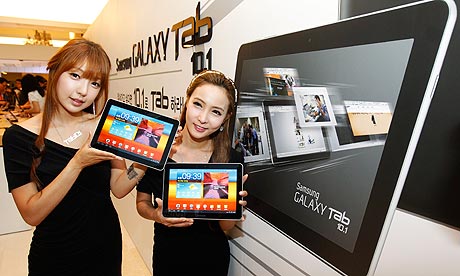Latest round in global battle over intellectual property goes to US company as judge grants preliminary injunction.

Source : http://www.guardian.co.uk/technology/2011/oct/13/apple-samsung-australia-tablet-blocked

Samsung's Galaxy Tab 10.1 was launched at the company's headquarters in Seoul. Now it's blocked in Australia. Photograph: Jo Yong-Hak/Reuters
An Australian court has temporarily banned Samsung from selling its new Galaxy tablet computer in the country, another setback for the South Korean electronics giant in a global patent battle with Apple, which accuses it of slavishly copying the iPad and iPhone.
Federal Court Justice Annabelle Bennett on Thursday granted a temporary injunction against sales of Samsung's Galaxy Tab 10.1 in Australia. The decision prevents Samsung Electronics Co. from selling the device in Australia in its current form until a further court order, or until a pending patent lawsuit between the warring technology giants is resolved.
The ruling is a blow for Samsung, which had hoped to launch the new product in time for Christmas sales. It comes after courts in other countries including Germany and the Netherlands made judgments that upheld Apple's claims that its intellectual property had been appropriated by Samsung.
Samsung has hit back with threats to ban sales of the new iPhone 4S in France and Germany on the basis that it infringes patents that it holds on certain mobile technologies.
The patent battle spanning 10 countries has created a perception of Samsung as an efficient imitator among technology companies rather than a pacesetter. Over the years, the company has grown to become the global No. 1 in TVs and No. 2 in smartphones by sales. But unlike arch-rival Apple, it has not mesmerised most consumers with its originality and innovation.
It emerged recently that during 2010, Steve Jobs, then Apple's chief executive, tried to broker a deal between the two companies. Samsung is a major supplier of components to Apple, and Apple is one of Samsung's biggest customers, besides their rivalry in devices.
The attempt failed and in April 2011, Apple, based in Cupertino, California, sued Samsung in the United States, alleging the product design, user interface and packaging of Samsung's Galaxy devices "slavishly copy" the iPhone and iPad.
Samsung, from Suwon in South Korea, fought back with lawsuits of its own, accusing Apple of patent infringement of its wireless telecommunications technology.
Apple filed the Australian lawsuit in July, accusing Samsung of copying its touch screen technology. In her ruling Thursday, Bennett said she was granting the temporary injunction in part because she felt Apple had a sufficient likelihood of winning the trial against Samsung.
The judge's full orders will not be published until Friday. It was not immediately clear whether Samsung could or would attempt to sell a variation of the device that removed the features Apple objected to in the Australian lawsuit.
"We are disappointed with this ruling and Samsung will be seeking legal advice on its options," Samsung said in a statement. "Samsung will continue its legal proceeding against Apple's claim in order to ensure our innovative products remain available to consumers."
Samsung, which filed its Australian countersuit in September, said it remained confident it could prove Apple violated its wireless technology patents.
"We will continue to legally assert our intellectual property rights against those who violate Samsung's patents and free ride on our technology," the company said in a statement.
An attorney for Apple declined to comment after the hearing.
Source : http://www.guardian.co.uk/technology/2011/oct/13/apple-samsung-australia-tablet-blocked